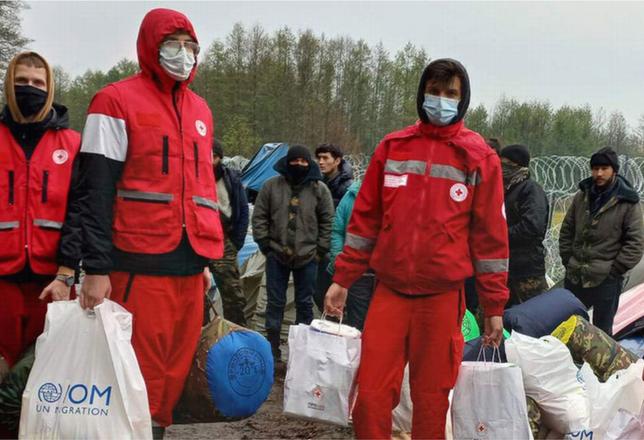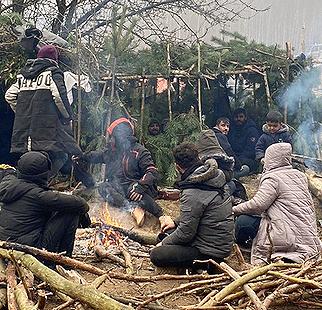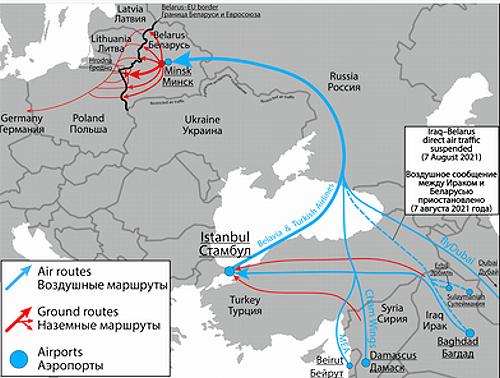Geopolitical Chess Game Uses Refugees as Pawns

Volunteers from the Belarus Red Cross deliver humanitarian aid to refugees and migrants blocked by barbed wire from entering the European Union at the Polish border. UN agencies are calling for an immediate de-escalation, following weeks of rising tension. November 9, 2021 (Photo courtesy UN International Organization for Migration) Posted for media use
By Sunny Lewis for Maximpact
BRUSSELS, Belgium, November 24, 2021 (Maximpact.com News) – The high-tension conflict over refugees at its border with Belarus has prompted the European Union to propose measures today to prevent and restrict the activities of transport operators smuggling or trafficking people into the EU.
The move is part of the response to what EU officials call “state-sponsored instrumentalisation of people at the EU’s external border with Belarus,” an expression that means using these refugees as leverage for political purposes.
European Commission President Ursula von der Leyen said, “Attempts to destabilise the EU by instrumentalising people will not work. The EU is united and taking various actions to resolve the situation at the EU’s external borders with Belarus. Today, we are presenting a new proposal to blacklist transport operators involved in smuggling or trafficking of people into the EU, as I first announced two weeks ago. We will never accept the exploitation of human beings for political purposes.”
The EU is proposing that transport operators smuggling or trafficking people be subject to:
- the limitation of operations in the Union market
- the suspension of licenses or authorisations
- the suspension of the rights to refuel or carry out maintenance within the EU
- the prohibition to transit or fly over the EU, make technical stops or call into EU ports
“It is the EU as a whole that is being challenged, especially Lithuania, Poland and Latvia, which have since the summer experienced an insidious new threat in the form of the instrumentalisation of desperate people,” von der Leyen said. “This has been initiated and organised by the Lukashenko regime luring people to the border, with the cooperation of migrant smugglers and criminal networks.”

Refugees huddle around a fire in sub-zero temperatures near the border of Belarus and the European Union.
(Photo courtesy UN International Organization for Migration via Twitter) Posted for media use
Each side blames the other and elevates its own role. The EU says Belarus’ actions have precipitated the humanitarian crisis that has stranded thousands of men, women and children in a vast forest in sub-zero temperatures. The situation escalated on November 8 when 2,000 people became stuck at the border.
On November 22, Belarusian President Alexander Lukashenko said his country was doing everything to prevent people from accumulating at the border.
The Lukashenko government has denied manufacturing a crisis and blames the West for the crossings and treatment of migrants.
Speaking virtually on November 22, Belarus’ Foreign Affairs Minister Vladimir Makei, reminded a High-level meeting in New York on the UN Global Plan of Action to Combat Trafficking in Persons that Belarus had introduced resolutions adopted by the General Assembly that resulted in that Plan of Action, and also the establishment of July 30 as World Day against Trafficking in Persons, and the establishment of the UN Voluntary Trust Fund for Victims of Trafficking in Persons, to which Belarus is donor.
The adoption at the current session of the UN General Assembly on the initiative of Belarus of the resolution “Improving the coordination of efforts to combat human trafficking” was welcomed in his country, Makei said.
The EU accuses Belarus of encouraging people from the Middle East and Africa to cross into EU countries through Belarus as a form of hybrid warfare in response to EU sanctions on Minsk over human rights abuses.
A NATO official termed the Belarusian government’s use of migrants “a hybrid attack,” meaning a combined military-political operation, and said, “NATO stands ready to further assist our allies and maintain safety and security in the region.”
In a November 23 report https://ec.europa.eu/info/sites/default/files/communication_instrumentalisation_migrants.pdf to all other EU authorities, the European Commission said, “A particularly cruel form of hybrid threat has emerged with the state-sponsored instrumentalisation of people for political ends. Such practices run counter to EU and universal values.”
“Recent actions by the Lukashenko regime and its supporters are to be seen in this light – as a determined attempt to create a continuing and protracted crisis, as part of a broader concerted effort to destabilise the European Union, testing its unity and resolve. These actions represent a real and present danger to the EU’s security,” the Commission wrote.
Deaths, Harsh Treatment at the Border Continue
At least 11 people have died in this round of the border crisis, and an estimated 2,000 people are living in makeshift camps near the border facing below-zero temperatures and a dwindling supply of essential supplies.
Following intense diplomatic outreach, the EU sent humanitarian aid and is working with UN agencies to support evacuations. Belarus has moved people into a heated warehouse from the makeshift camps at the border.
In a change of direction that may help calm the crisis, Belarus authorities on Thursday cleared the main makeshift camps where migrants had huddled at the border with Poland.
Most occupants of these camps have been moved “on a voluntary basis” into a nearby heated warehouse that has been converted into a reception centre. Media reports showed hundreds of people, including young children, resting on mattresses.
Border Tensions Escalate
But today, BELTA, the state-owned national news agency of Belarus, says the situation on the Belarusian-Polish border remains tense and blamed Polish security forces for gassing the refugees.
“On November 23, two foreigners approached the Polish barriers to ask about the opportunity to apply for refugee status. The men did not take any aggressive actions. Despite the peaceful appeals of the refugees, the Polish soldiers simply sprayed pepper gas,” BELTA reported the Central Committee of the Communist Party of Belarus as saying. “One of the foreigners, the victim after the use of special means, tried to seek medical help, and in response, the Polish servicemen who watched the torment of the foreigner simply grinned.”
Another refugee, filming a video, repeatedly called on the Polish security forces to stop the bullying. And when the Polish law enforcers got tired of listening to requests for help, they cynically filled the person in need of protection with pepper gas again with the words ‘go away.'”
At night, when a group of desperate refugees decided to illegally cross into Poland despite the lack of a legal opportunity to apply for asylum in the EU, “This time, the Polish security forces met the refugees with automatic bursts,” BELTA reported.
Earlier this week, Polish forces used tear gas and water cannon to repel migrants and refugees who were attempting to cross the border.
One Syrian asylum-seeker, who recently arrived in Poland after his third attempt at crossing the border from Belarus, told CNN that on arriving at the border, guards caught him and three others in his group. He was beaten up, and suffered facial injuries, a broken nose and bruised ribs.
A Syrian couple, both injured, told the Polish Centre for International Aid, a local NGO, that their one-year-old child had died in the forest where they had been living for about 45 days. ENS and UN agencies have not been able to confirm the death. Earlier this week, funerals were held for two Syrian men who died near the border.
EU Unites Allies Against ‘Instrumentalising’ Refugees
Since the beginning of the crisis, the EU has been building a global coalition to oppose the practice of instrumentalising people to use them for political leverage, following a TeamEurope approach.
This month, European Commission Vice-President Margaritis Schinas of Greece, together with Vice-President Josep Borrell of Spain, who also serves as the High Representative of the Union for Foreign Affairs and Security Policy, have been travelling to the main countries of origin and of transit to request that they act “to prevent their own nationals from falling into the trap set by the Belarusian authorities,” the European Commission said in a statement.
As a result, a number of countries of origin and transit have suspended flights to Belarus and strengthened the screening of passengers at airports.
European Commissioner for Transport, Adina Valean of Romania, said, “The strong and immediate cooperation we witnessed from the global aviation community in the past weeks shows it is essential to involve transport operators closely in preventing and combatting this new form of hybrid threat.”
“Our new proposal on measures to target transport operators that facilitate or engage in smuggling will give us a powerful tool to take action where operators seek to benefit from the exploitation of people,” Valean said.
Unwanted Repatriation
Many of those stranded at the border sold everything they had to leave their countries of origin in an attempt to create a better life for themselves and their families.
Many of the migrating people in this crisis are Iraqi. Direct flights from Baghdad to Belarus were suspended in August, following which flights from Erbil transiting through third countries to Belarus were also stopped. Iraq is organising repatriation flights for Iraqis, with EU support and with further financial assistance for reintegration to Iraq still to come.
On November 18, more than 400 Iraqis, many of them Kurds, who had camped for weeks on the Belarus-EU border, flew back to Iraq on a charter flight from Minsk to Baghdad and Erbil organized by Iraq.
After the European Commission and Germany rejected a proposal by Belarus that EU countries take 2,000 migrants and refugees into its territory, Minsk has said it would return another 5,000 to their home countries.
The viewpoint of Iraqi Kurds caught in this situation is illuminated by Farhang Faraydoon Namdar, a researcher and journalist covering the Middle East, in a November 13 article for the KurdPress.
“Kurdish immigrants came to the world’s attention when thousands of refugees began crossing the Belarusian border into Poland, sparking a new crisis on the European Union’s eastern border. Polish authorities responded by deploying 15,000 troops on the Belarusian border,” wrote Namdar.
“The United States and the European Union have accused Belarus of weaponizing these immigrants. Since June 2021, Belarus has facilitated visa requirements for Iraqi citizens, streamlining a once-arduous process for thousands of migrants who flew to the country and have been living in forested areas without food and shelter,” he wrote.
“Through its creation of an artificial refugee crisis, Minsk has both diverted the world’s attention from its domestic affairs and retaliated against sanctions imposed on it by Brussels. And, once again, Kurds have become pawns in the Russian geopolitical rivalry with the United States,” Namdar wrote.

Routes of illegal migrants involved in the 2021 Belarus–European Union border crisis (Map by Uladzimir, Minsk, Belarus via Wikipedia)
In response to the situation, Polish prime minister Mateusz Morawiecki wrote on Facebook: “The border of the Republic of Poland is not just a line on a map. It is sacred – the blood of Poles was split over generations to protect it!”
“Iraqi migrants appear to be reigniting ancient rivalries in Europe,” commented Namdar.
Humanitarian Help Under Tough Conditions
The EU has allocated €700,000 in humanitarian assistance for vulnerable refugees and migrants stranded in Belarus, at the borders and inside the country. Of this total, €200,000 is going immediately to support the International Federation of Red Cross and Red Crescent Societies (IFRC) as part of the EU’s overall contribution to the Disaster Relief Emergency Fund, managed by the IFRC.
This EU funding is helping the IFRC and its national society, the Belarus Red Cross, to deliver food, hygiene kits, blankets, and first aid kits. An additional €500,000 is mobilised for further humanitarian assistance to be implemented by EU’s partner organisations on the ground.
But access to the border area is restricted; aid workers and journalists have been blocked from traveling to the area by an exclusion zone.
Belarus Red Cross has been coordinating aid from partners, distributing food, water, blankets and warm clothes. Staff and volunteers are involved in a continuous response to the situation, sorting and distributing packages, helping set up heating tents for women and children.
Andreas von Weissenberg, IFRC Europe’s head of Disasters, Climate and Crises, said, “We are concerned about the increasingly serious situation on the Poland-Belarus border, after large groups of migrants arrived there on November 8. We call for access for the Red Cross and other humanitarian organizations so that all people in need, at the border and other locations, can receive medical treatment, humanitarian assistance and protection services.”
“While Belarus Red Cross has thankfully been given some access to provide vital life-saving aid to people enduring hunger and freezing conditions, we need that access to be regular and also get access on the other side of the border. People need to be treated humanely,” von Weissenberg said.
The Polish Red Cross has been responding to this crisis for several weeks, delivering blankets, sleeping bags and clothes. Local branches are supporting migrants in provinces near the border with food, water and hygiene kits, as well as providing first aid and helping people trace family members.
Lithuanian Red Cross teams have been supporting migrants close to the border with water, hygiene kits, footwear, clothing, and toys for the children. In five large reception centers, volunteers provide food and other humanitarian aid, offer psychological support and legal assistance and help people reconnect with their loved ones by providing mobile phones and SIM cards.
As of November 16, the total number of arrivals in the EU from Belarus in 2021 was 7,698, with 4,222 in Lithuania, 3,062 in Poland and 414 in Latvia, the EU reported Monday. There have been over 40,000 repeated attempts to cross these borders prevented during 2021.
Most of the migrants involved are from Iraq and Afghanistan. The EU states, “Independently of the state-sponsored instrumentalisation of migrants, a number of Belarusian nationals are seeking to escape the repression by the Belarus regime.”
Pawns in a Geopolitical Struggle
EU officials view the conflict as an attempt to weaken and destabilize the European Union. Vice-President Borrell, said, “The Belarusian regime tries to distract from the appalling situation in the country by taking advantage of people’s dismay and pushing them towards the EU’s borders. They will not succeed.”
“In response, we expanded our sanctions regime and are adopting another package of measures against the perpetrators of this hybrid attack by the Lukashenko regime. Together with UN agencies, we will provide humanitarian aid to those in need. We will continue our diplomatic outreach to our partners,” Borrell said. “The EU stands firm against this hybrid attack.”
Vice-President Schinas said, “Ordinary people are being sold a lie by the Belarusian regime working with international smuggling networks. What is happening at our borders is not a migration issue but a security one. And the EU is showing that it will be unrelenting in our response.”
“Thanks to determined and comprehensive EU action together with our partners, we are starting to see improvements,” Schinas said. “And the blacklisting mechanism we are proposing today is a further tangible expression of our willingness to act decisively. This is a global problem and we must build an international coalition against the use of people as political pawns.”